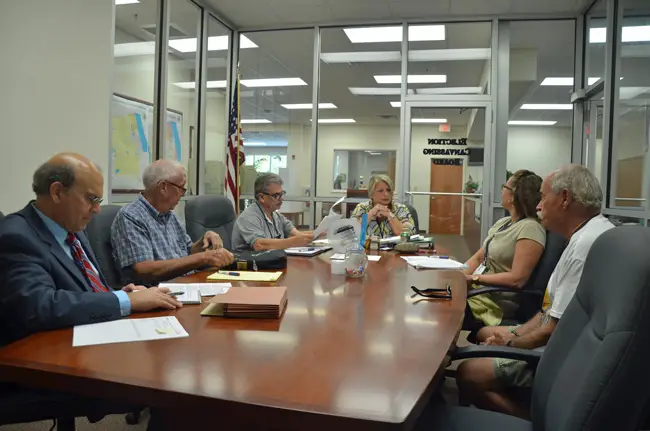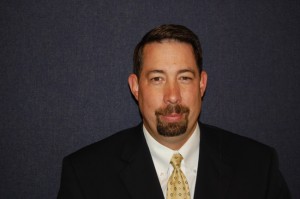
The Flagler County administration is considering legal action following Supervisor of Elections Kimberle Weeks’s recording of a conversation between Commissioner Charlie Ericksen and County Attorney Al Hadeed, made at the supervisor’s office, without Ericksen’s or Hadeed’s knowledge. The recording last month took place during a Canvassing Board meeting, but meeting participants had adjourned to a different part of the building, to the opposite end of a room adjoining the conference room where Weeks’s recording, from an iPhone, was taking place. The Palm Coast Observer’s Jonathan Simmons first reported on the issue last week. County Administrator Craig Coffey, in collaboration with staff, drafted the following response to the supervisor’s taping.
By Craig Coffey
The improper recording of a private conversation by Supervisor of Elections Kimberle Weeks, that both [ex-County Commission candidate] Dennis McDonald and Weeks have been distributing, is just the latest dramatic stunt to divert attention away from a very adversarial elections office. Although illegal, the recording being sent out is actually very positive because it is an example of how election law works and shows a Canvassing Board Attorney doing his job.
To set the context of the recording that was sent out, on Aug. 25, 2014, there was a canvassing board meeting. Commissioner Charles Ericksen, an alternate on the board was there in attendance as a member of the public. Al Hadeed, county attorney and attorney to the Canvassing Board, arrived a few minutes late to the meeting. The Canvassing Board had started in one room and then gotten up and moved to an adjoining room. Now in a separate room from the Canvassing Board meeting, Commissioner Ericksen was bringing Hadeed up to date on an incident that just happened in which a member of the media was asked to leave because he was taking pictures, and the stated concern was that a ballot might be visible. Responding to the story, Hadeed then discussed some of the reasons why taking pictures could be perceived to cause an issue. That was not the case here because the picture being sought was a broader landscape shot of all the canvassing board member at work and not of ballot materials.
In discussing that matter further and as part of a much larger conversation, Hadeed shared a story with Commissioner Ericksen that occurred in the distant past (prior to the current supervisor’s tenure) with a former commissioner, and matters of perception. In the audio Hadeed is heard stating the former commissioner looked at absentee ballots envelopes that were being opened, and then got up to make a phone call during this canvassing board process. The phone call could have had nothing to do with the election, but the action of the commissioner at the time presented the “appearance of an impropriety.”
Back then, as Canvassing Board Attorney, Hadeed stated he did his job and told the former commissioner that phone calls while opening absentee ballots or studying them was not an acceptable behavior. According to Hadeed, the commissioner immediately changed behavior.

In the latter part of the selected audio, Commission Chairman George Hanns, himself a member of the Canvassing Board, and others can be heard entering the room, which is also the point when the Canvassing Board relocated back into the room (where the meeting originally started). Hanns could be heard stating, “Well, she is not recording this anyways”. He said this for two reasons: First, often as meetings adjourn, Hanns announces the time and date of the next meeting. Without recording it similar to the county commission meetings he felt there was no point. However, the main reason he made that statement was that Weeks had gone out of her way to get the OK from the Canvassing Board not to record its public meetings.
Several meetings later, when the minutes came back with Weeks’s comments transcribed almost verbatim and everyone else on the Canvassing Board with hand-picked summarized comments, she admitted to secretly recording the meetings on her phone.
At the meeting on September 12, Commissioner Hanns asked for a copy those recordings. A week later his request remained unfulfilled. Earlier this week the County Administrator submitted a follow-up request and the requested recording had not been received. This despite the fact that she was able to send audio recordings to her political supporters (former Commissioner Candidate McDonald) and a local radio station on Wednesday. [The request was finally fulfilled last Thursday morning, Sept. 25.]
In summary, the taped conversation is positive despite the creative spin attempted by Weeks and political candidate McDonald. However, the taping of the private conversation on August 25 and replaying it publicly by Weeks, and then subsequent distributing the private conversation, is not legal and is a clear violation of state law.
The taping occurred outside of the canvassing board meeting. According to Fla. Statute 934.03 it is a third degree felony to tape a private conversation without knowledge of both parties and it is also a third degree felony to distribute the recording to others.





























Leave a Reply